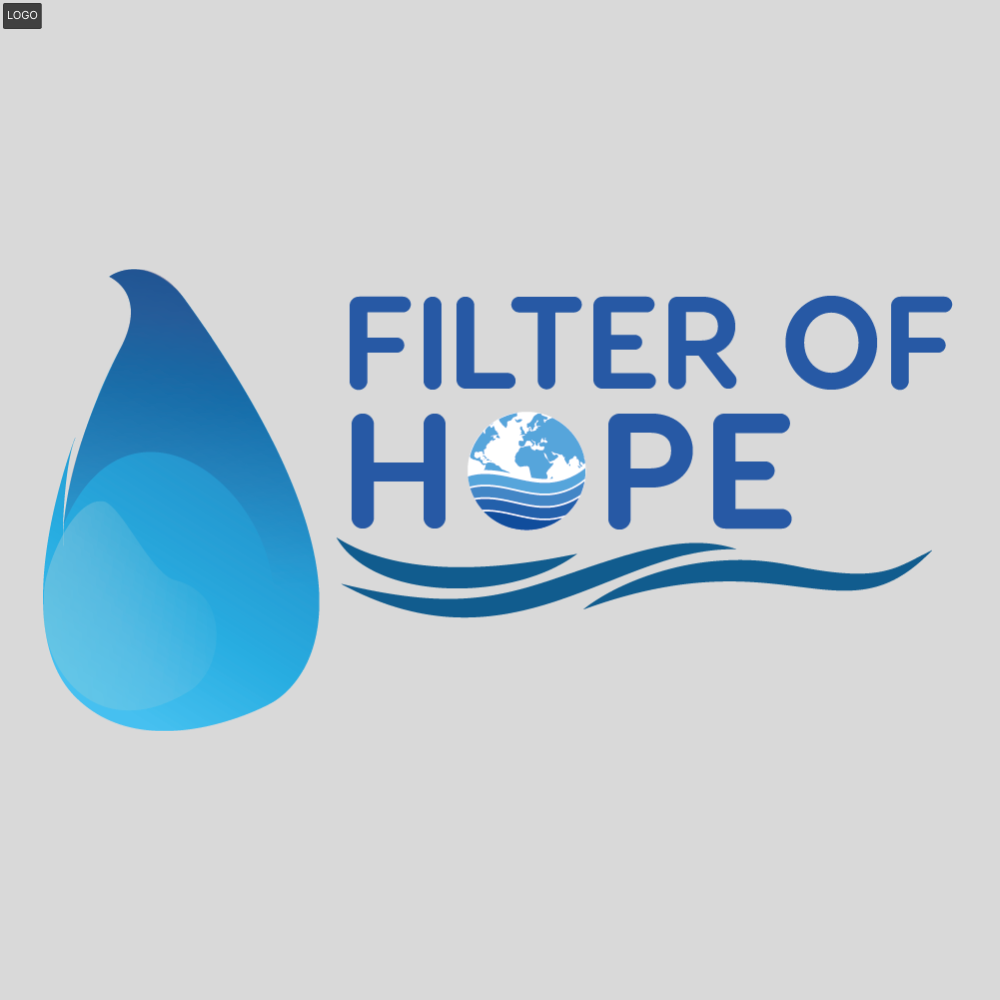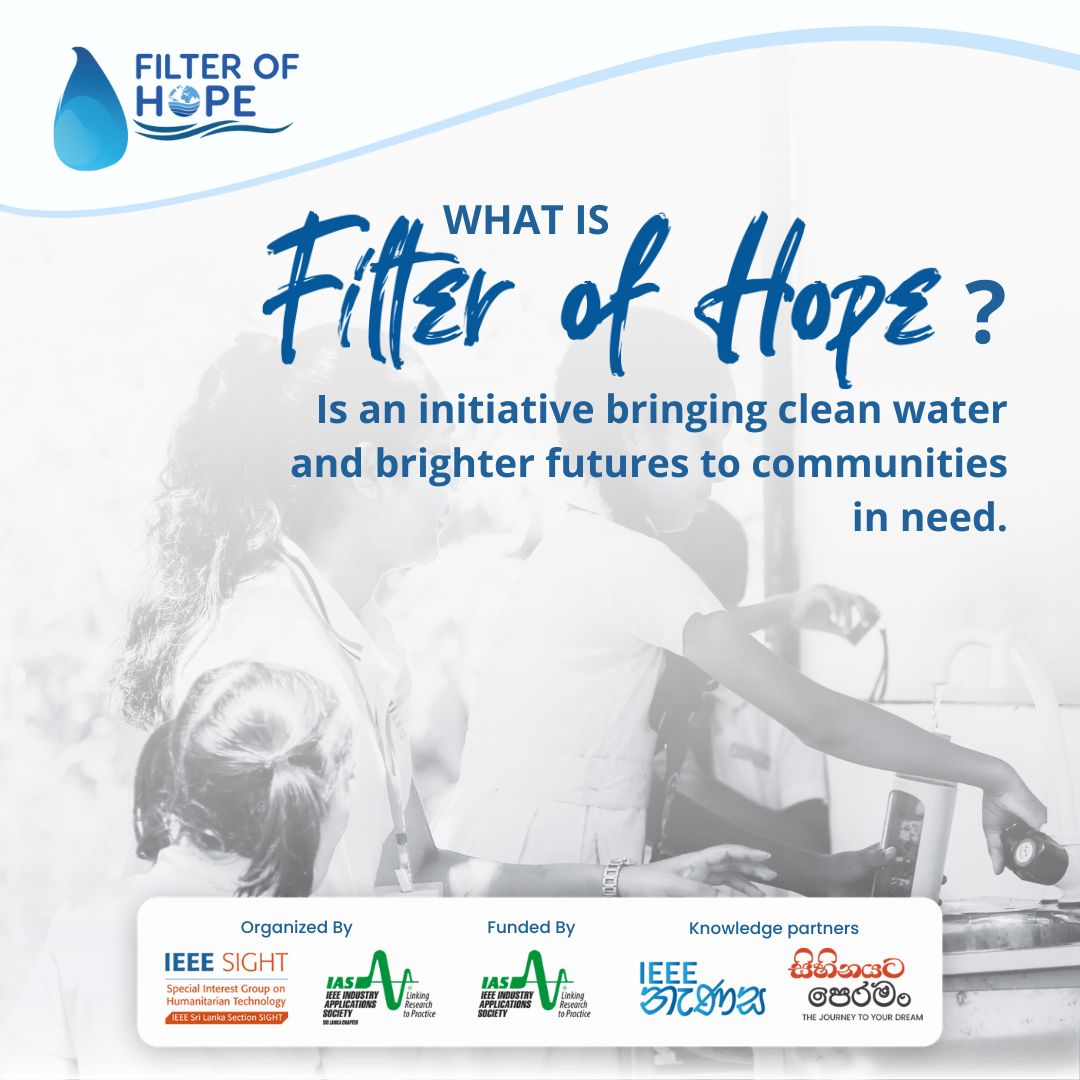

Awareness Session The ‘Filter of Hope’ project initiated by IEEE Sri Lanka Section SIGHT is aimed at providing purified water to two villages in Polonnaruwa district of Sri Lanka. The villagers have been suffering from Chronic Kidney Disease (CKD) which is said to be a result of impure water consumption. Under this project IEEE Sri Lanka Section SIGHT intends to do is to establish a customized RO filter which will be based on the water samples tested in laboratories. The installation of the filter will be done at a common water source (well) which has the capacity to provide water to the villagers.
The IEEE xTEND project, in partnership with the IEEE Industry Applications Society Sri Lanka Chapter, addressed the critical issue of Chronic Kidney Disease of Unknown etiology (CKDu) in Sri Lanka by providing clean drinking water through reverse osmosis (RO) systems in affected areas.
The project resulted in a significant reduction in CKDu cases and improved overall health outcomes in the community. Additionally, it raised awareness about water safety and hygiene, empowering residents to maintain healthy practices.
Introduction
IEEE SIGHT is a network of IEEE volunteers around the world to address local societal challenges using technology in the humanitarian technology space. Being an integral part of the communities where we operate, IEEE Sri Lanka Section SIGHT Group believes in enhancing and enriching the lives of those around us. Hence, the group has taken steps to address issues in local communities through several initiatives.
Problem Definition
Chronic Kidney Disease of unknown etiology (CKDu) represents a significant and enduring public health challenge in Sri Lanka, particularly impacting farming communities. The issue initially came to light in the early 1990s, notably among rice farmers residing in the North Central province. CKDu is a variant of Chronic Kidney Disease (CKD) characterized by an elusive cause, and this enigmatic condition has been reported in various countries worldwide in recent years, where the underlying etiology remains unidentified.
Recognizing the critical nature of the situation, the World Health Organization (WHO) made recommendations for the provision of safe water in CKDu-affected areas. Reverse osmosis (RO) water purification technology has been used to supply some areas with water over the past few decades to ease the CKDu epidemic. These measures have resulted in positive health outcomes and disease progression reduction.
In essence, the "Filter of Hope" project addresses the important issue of assuring access to clean and safe drinking water in CKDu-affected regions, particularly in rural dry zone districts of Sri Lanka. The major goal of the project is to design, deploy, and maintain custom-designed RO water filtration systems that are suited to the communities' specific water quality concerns. By establishing a reliable source of clean water, "Filter of Hope" aims to break the adverse connection between CKDu and poor groundwater quality, ultimately enhancing the health and well-being of affected individuals and contributing to the long-term improvement of public health in these afflicted regions.
Project Outline.
The IEEE Sri Lanka Section SIGHT Group, deeply embedded in the communities it serves, is guided by the principle that Corporate Social Responsibility (CSR) should have a substantial and positive impact on the lives of the people within its reach. "Filter of Hope," Phase 03, took place in Eppawala, situated in Anuradhapura District. This initiative embodies our commitment to bring about tangible improvements in the quality of life for those we serve.
In the third phase of "Filter of Hope," we directed our attention to Nabadewewa, a village inhabited by approximately 550 residents. Despite being designated as a critically affected area, no prior water purification system had been established. Recognizing this urgent need, the IEEE Sri Lanka Section SIGHT Group designed and implemented a customized Reverse Osmosis (RO) filtration system, informed by extensive water sample analysis.
Following a visit to the location and the collection of water samples early in 2024, the project was set in motion. These water samples underwent rigorous testing at the Water Testing and Anuradhapura Regional Laboratory within the National Water Supply and Drainage Board, covering a comprehensive analysis of 31 key parameters, including Nitrates, Nitrites, Chlorides, Arsenic, and Bacteriological assessments. Our plan was to install an RO water filter at Nabadewewa Sri Sumangala Maha Vidyalaya, an ideal location for easy access by needy communities. However, an unexpected challenge arose due to the lack of electricity in the installation building. Undeterred, we embarked on an extensive effort that involved building and fixing facilities for the RO filter, initiating the process to provide electricity to the classroom, and even renovating the building to ensure a safe environment for the filtration system. The collaborative spirit of the project site community, comprising government officials, religious leaders, and villagers, played a vital role. The unwavering support and mentorship from the school's principal and religious leaders, along with the villagers' contributions to the filter cabin renovations, were instrumental in achieving this milestone.
With a customized RO filter system designed based on water sample analysis, we successfully installed the system at Sri Sumangala Maha Vidyalaya in June 2024. This marked a significant achievement, celebrated with an opening ceremony where Dr. E.M.U. Ekanayake from the National Nephrology Specialized Hospital, Polonnaruwa, delivered an awareness session on water purification and the importance of consuming purified water. Furthermore, the supplier provided materials and conducted an awareness session on RO filter maintenance for the benefit of the filter's beneficiaries, emphasizing our commitment to delivering clean and safe drinking water to the community. Moreover, the partnership with Maheweli Chemicals Kent Minerals Reverse Osmosis Water Purifiers (Pvt) Ltd was a significant milestone in ensuring the success of our "Filter of Hope" project. Their dedicated commitment to offering lifetime after-service for the filtration system, starting from its installation, is of immense value.
The profound impact of the "Filter of Hope'' phase 03 extends to approximately 650 students currently attending the school and an additional 750 families residing in Nabadewewa-Eppawala village. By providing access to clean and safe drinking water, this project has not only enhanced the health and well-being of the students but has also positively transformed the lives of the entire village community.
In addition to the vital infrastructure setup, our commitment extends to educational initiatives and long-term quality assurance for the "Filter of Hope" project. We conducted an awareness session tailored for the local population, aimed at disseminating valuable information and providing documented resources on the proper usage of filtered water and RO filtration systems. This educational effort is pivotal in ensuring that the villagers not only have access to clean water but also understand its significance and how to effectively utilize the newly installed system for their well-being.
Furthermore, our ongoing objective involves continuous monitoring of the water quality at regular intervals after the RO filtration system has been installed. This proactive approach will enable us to consistently assess the quality of the water supply and identify any potential issues. In doing so, we can swiftly make the necessary adjustments to maintain the highest standards of water purity, safeguarding the health and benefit of the community we serve. This holistic approach ensures the sustainable impact and success of the "Filter of Hope" project in the long run.
Impact of the “Filter of Hope” project
The "Filter of Hope" project has made a profound impact on the school and the surrounding villagers by providing clean and safe drinking water, a critical achievement that has far-reaching implications. This access to clean water has not only improved overall health but has also substantially reduced waterborne diseases, leading to a remarkable enhancement in the well-being of the entire community. Consequently, there has been an increase in school attendance, better academic performance among students, and an overall improvement in community health. The successful completion of infrastructure improvements through collaboration with local authorities, community members, and school staff underscores the importance of collective effort in achieving lasting change.
Moreover, the benefits of these improvements are expected to endure over the years, as clean water access and enhanced facilities continue to positively impact the community. This project aligns with the United Nations Sustainable Development Goals, particularly Goal 6, which aims to ensure universal and equitable access to safe and affordable drinking water by 2030. By addressing this critical goal, the "Filter of Hope" initiative contributes significantly to achieving this global objective.
In addition to its tangible impacts, the project has highlighted the importance of community engagement and transparent communication. Understanding the local community's needs and expectations has been crucial in building trust and ensuring the project's long-term success. The provision of educational opportunities and career guidance to students is another aspect of this initiative that promises to have a lasting positive impact on individual lives and the community as a whole, promoting sustainable development.
This project represents a significant milestone as the inaugural project of IEEE Sri Lanka Section SIGHT. It has been an invaluable learning experience for the volunteers involved. This insight has prompted a refinement of project planning and management strategies, equipping the team with a deeper understanding of the challenges and uncertainties that can arise during community initiatives. Moving forward, this experience positions them better to adapt and ensure successful project outcomes while staying steadfast in our mission to make a positive and lasting impact on underserved communities.
Conclusion
In conclusion, the "Filter of Hope" project has achieved its primary objective of providing clean and safe drinking water to the school and the surrounding villagers. Beyond this, it has positively impacted health, education, and community well-being. This initiative exemplifies the power of collaboration, dedication, and community involvement in making a positive and lasting impact on underserved communities. It not only aligns with global sustainability goals but also serves as a valuable learning experience for our team, equipping us to adapt and ensure successful project outcomes in future endeavors. The "Filter of Hope" project stands as a beacon of hope, demonstrating the transformative potential of humanitarian efforts.


